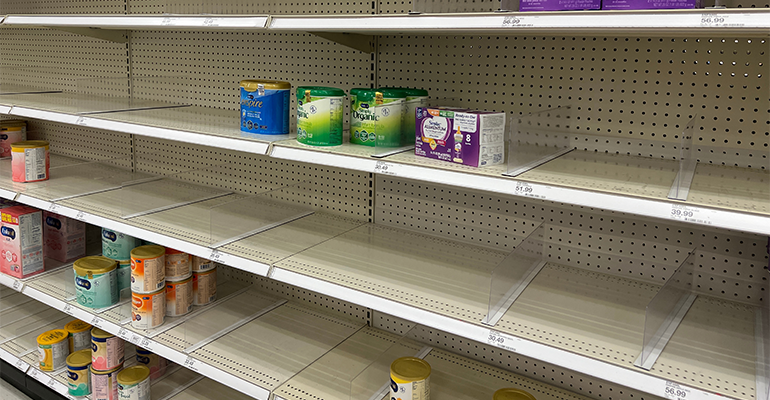News
Infant formula shortage in the US: How to prevent a future crisis
15 Jul 2022
Following a series of events which led to the US being unable to meet its needs for infant formula, action is needed to prevent future shortages, says the non-profit Center for Science in the Public Interest.
“The infant formula shortage in the US is swiftly resolving, thanks to efforts by the federal government and industry to ramp up production and secure imports,” says Sarah Sorscher, deputy director of regulatory affairs, Center for Science in the Public Interest, a non-profit watchdog that advocates for safer and healthier foods based in Washington D.C., US.

The latest figures published by the White House show that sales of infant formula are up 24% compared to the same four-week period in 2021. “These figures suggest that any remaining local shortages are driven not by reduced supply but by increased consumer demand, ie consumers continuing to stock up due to concerns about prior shortages,” says Sorscher.
Despite a seeming respite from the indication in June 2022 that stock levels of infant formula in the US were getting worse, consumer concerns and industry questions remain about whether such a crisis could occur again in the future and how it can be avoided. The message was clear: the US does not have sufficient infant formula to meet its demand.
“Originally, the shortage began with similar issues that have plagued the food industry throughout the pandemic,” says Sorscher. Out-of-stock levels were creeping up as early as January 2022 due to factors including reduced access to labour, transportation and raw materials.
Infant formula production disruption and investigation
In February 2022, the Food and Drug Administration (FDA) announced it was investigating cronobacter infections due to powdered infant formula and advised the public not to use recalled Similac, Alimentum or Elecare powdered infant formulas manufactured at Abbott Nutrition's Sturgis facility in Michigan, US.
On the 22nd June 2022, the FDA provided an update on the steps taken to ensure Americans have access to safe and nutritious infant formula as the country works to prevent insufficient supplies. In a statement, Robert M. Califf, commissioner of the FDA said: “I have personally spoken with infant formula manufacturers over the past several weeks and all have significantly increased their production efforts, which is resulting in more supply that will be available on store shelves moving forward.”
The agency announced it was conducting regular inspections of infant formula facilities on a regular basis. The news came shortly after Abbott’s statement on 15th June 2022 detailing that severe weather had caused flooding in the company’s Michigan-based production plant areas.
“The Abbott outbreak and resulting recall were like pouring gasoline on a campfire: overnight, the recall knocked out one of the largest formula production facilities in the nation and the sole supplier of certain brands of specialty formula for babies born with rare metabolic conditions,” says Sorscher. “Not only was this a blow to supply, but it also ramped up demand, as consumers facing empty shelves began seizing any formula they found available,” Sorscher adds.
The US response to the shortage
“Steps by formula manufacturers, Congress and the White House have both helped to ease the crisis,” says Sorscher.
Facilities that were not impacted by the recall ramped up production, and the White House further supported this by invoking a statute known as the Defense Production Act, essentially declaring the shortage a matter of national security. As a result of the passing of this law, formula makers were given automatic preference in contracts for supplies of raw material, transportation, entry at ports and other areas that enable infant formula production.
The White House also initiated operation ‘fly formula’, Sorscher says, providing for the importation of formulas manufactured abroad. In addition, Congress passed emergency legislation to waive certain rules that were preventing low-income families from having flexibility in accessing substitute formulas.
Avoiding a future crisis
Attention turns to how to prevent a similar infant formula shortage. Recent research by Abrams and Duggan (May 2022) in The American Journal of Clinical Nutrition answers this question. The study, entitled Infant and child formula shortages: now is the time to prevent recurrences, sets out key policy changes that need to occur to prevent future formula shortages, including setting government rules on formula production; creating a national plan regarding the assessment of formula demands and responses to shortages; and launching a database that houses information on similar formulas.
“Longer-term, Congress and the White House need to set in place factors to reduce the occurrence of shortages,” says Sorscher. Congress is currently deliberating on a Bill likely to pass in 2022 that will require manufacturers of infant formula and essential medical foods to notify the FDA of potential supply chain disruptions and develop risk management plans. “Similar policies have helped FDA reduce the frequency of prescription drug shortages by identifying weak points in supply chains early on and working with industry to address them,” adds Sorscher.
Highly consolidated: Four companies control 90% of US infant formula market
In addition, consideration should be given to promoting competition in the infant formula market. “The infant formula industry is highly consolidated, just four companies control 90% of the market,” Sorscher continues. The Sturgis facility supplied as much as one-fifth of the infant formula in the country, and they were the only supplier of certain lines of speciality formula intended for infants with special needs. “This consolidation makes the formula market highly vulnerable to future potential disruptions,” says Sorscher.
Achieving these steps is not without its challenges, however. “Breaking up the consolidated formula industry will likely pose the greatest challenge and may require looking at the role of government feeding programs to increase the number of companies able to supply formula through these programs,” Sorscher says, citing recent insights from the Centre on Budget and Policy Priorities.
Related news

Soy story: WWF scores UK supermarkets on sustainability efforts
12 Nov 2025
WWF has published its latest “Soy Scorecard”, ranking UK supermarkets’ efforts to combat deforestation and land conversion in their soy supply chains.
Read more
Standing Ovation and Bel scale up casein production from dairy co-products
11 Nov 2025
Foodtech company Standing Ovation has partnered with cheese specialist Bel Group to manufacture dairy serums for industrial-scale casein production via precision fermentation.
Read more
New UPF standard hoped to offer consumers ‘coherence and clarity’
10 Nov 2025
Ingredients companies are being urged to enter “a new era of partnership and innovation” following the launch of the industry’s first non-UPF verification scheme.
Read more
Whistleblowers accuse UK meat industry of promoting cheap, unsustainable supply
7 Nov 2025
An anonymous group of industry insiders has accused the UK’s biggest food companies of systematically driving down meat quality and welfare standards.
Read more
Bord Bia presents Irish dairy ingredient suppliers at Fi Europe
6 Nov 2025
Dairygold Co-operative Society, The Carbery Group, and Ornua Co-operative: Meet with sustainable producers of Irish dairy ingredients at Food ingredients Europe 2025, Hall 7.2 Stand M18.
Read more
AI attraction means foodtech startups must ‘prove’ rather than ‘promise’
4 Nov 2025
Reports suggest that artificial intelligence (AI) is sucking investment from foodtech and agritech, but investors say the picture is complicated.
Read more
Penguin and Club bars no longer classed as chocolate
30 Oct 2025
Penguin and Club bars can no longer be classified as chocolate after the pladis-owned McVitie’s brands turned to cheaper alternatives amid the ongoing cocoa crisis.
Read more
Could plant-based protection replace plastic packaging?
29 Oct 2025
Swedish foodtech company Saveggy has launched an additive-free plant-based protection for cucumbers, offering a waste-free packaging solution for fruit and vegetables.
Read more
Does promoting protein content push up plant-based sales?
27 Oct 2025
Promoting the protein content of meat-free products is a more effective sales strategy than adding carbon labels, a study of UK bakery chain Greggs suggests.
Read more
Amazon Grocery launch aims to balance quality with affordability
22 Oct 2025
Global e-commerce giant Amazon has introduced a new private-label food brand, combining existing Amazon Fresh and Happy Belly products with new everyday items.
Read more